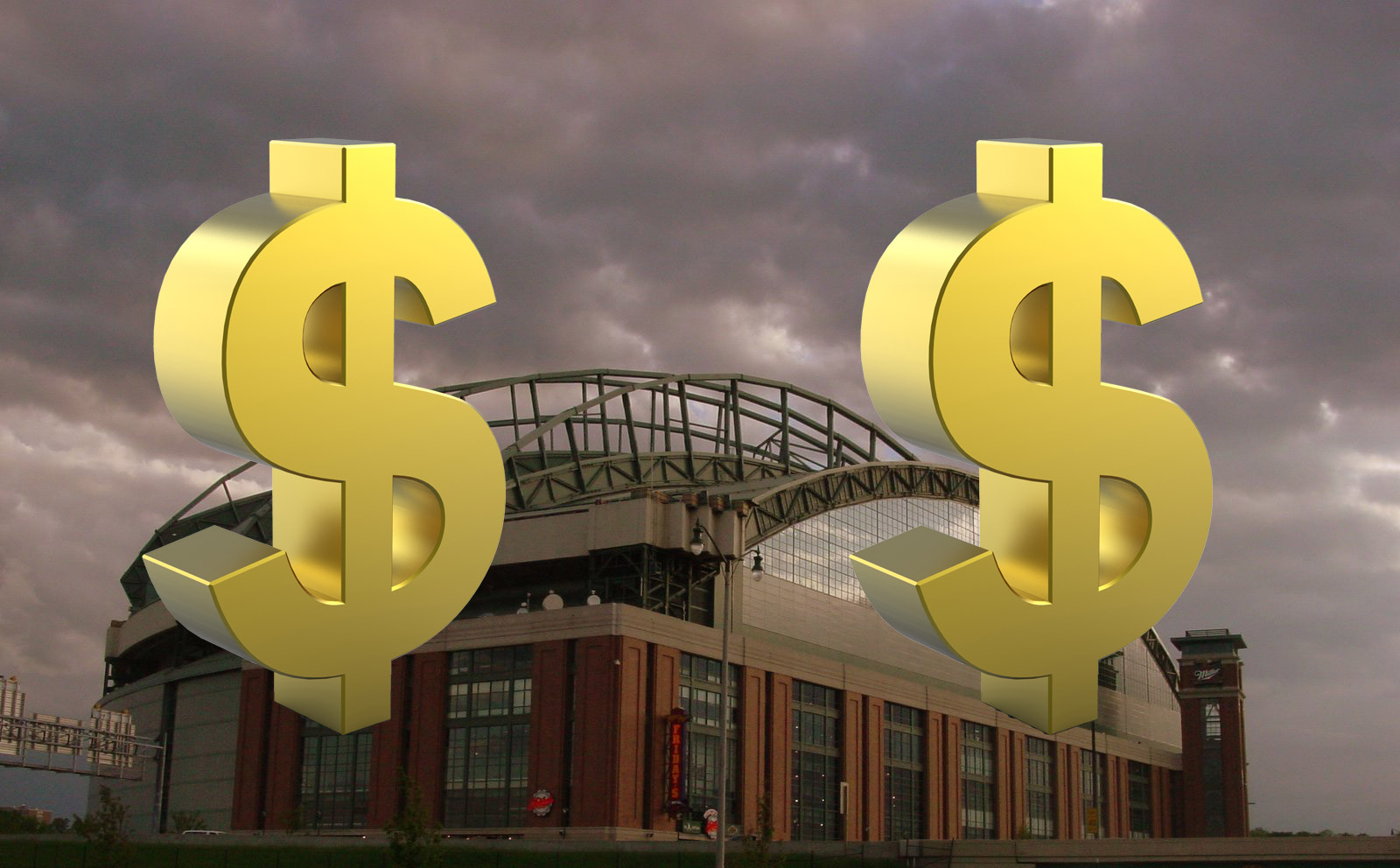Miller Park Tax Ends in 2020. Not.
Despite “sunset,” taxpayers will subsidize stadium until 2040, with total costs unknown.
It happens every spring. That’s when baseball fans get ready for opening day and America’s pastime, and when the press annually returns to the issue of the Miller Park tax subsidy. In anticipation of this, the Southeast Wisconsin Professional Baseball Park District issues its now-yearly “Sunset Date Report,” a projection on when the sales tax paying for the Milwaukee Brewers baseball stadium will end.
The good news, we’re told, is that the Miller Park tax is projected to sunset in late 2019 or early 2020, as Fox 6 recently reported and the Racine Journal Times reiterated.
That’s technically true, but quite misleading. For it suggests we will no longer be paying to subsidize a for-profit Major League Baseball franchise worth $925 million and owned by mega-wealthy money manager Mark Attanasio. But in fact we will actually be subsidizing the ever-more valuable team and ever-richer owner at least through 2040 — if not forever.
In addition, the stadium authority is putting aside money to pay for any expenses that may arise for capital costs: perhaps for a new scoreboard or maybe a new engine, or “bogey,” that moves panels of the convertible roof along a semi-circular rail system. (A replacement bogey cost $13 million at the end of the 2006 season.)
As of 2016, the total money salted away was $52 million, Duckett told me. It will likely be a good deal higher by 2020. (Duckett was out of town and not available to offer any updates.) The entire reserve is being collected from taxpayers ahead of time, to assure we continue subsidizing the Brewers for the next two decades.
The Miller Park tax has been collected from Milwaukee, Waukesha, Washington, Ozaukee and Racine counties since 1996. The earliest projections were that the tax would sunset around 2010, but that was moved back to 2014 and then over time to 2017, 2018 and then early 2020.
Duckett told the Racine Journal Times that the economic downturn caused a reduction in sales tax collections, which explains the ever longer payoff date for the stadium. But the downtown has also meant far lower interest rates, which has allowed the stadium authority to repeatedly refinance the bonds issued to pay for Miller Park’s construction. The bonds were refinanced in 1998, again in 2001, and the district’s latest financial statement says it did “debt defeasances” in 2005, 2008, 2015 and 2016 which I’m guessing involved refinancing, though the report doesn’t address this.
“Every decision we make is made with the goal of turning off this tax as soon as possible,” Duckett recently told the Milwaukee Journal Sentinel. In fact there is a long list of additional expenses the district incurred over the years, including:
-$15 million (over five years) for the stadium authority’s administrative and operating costs;
-A new $11 million scoreboard, with taxpayers paying $5.9 million of the cost;
-$4.9 million on furniture and equipment the Brewers requested, including a whirlpool bath, ice machines, sauna and steam room, batting and pitching machines, exercise equipment and video coaching system;
-$3.9 million for an LED ribbon board encircling the stadium’s seating bowl;
-$1.6 million on public relations (over six years) to make the stadium authority look good.
These are merely the biggest ticket items among many more charged to taxpayers and reported in 2012 and in 2016.
The “sunset date” and even the total of sales taxes paid doesn’t tell us the total bill paid by taxpayers, because some of that money was recouped through refinancing, with all the gains retained by the stadium authority. And none of this is accounted for by the stadium authority, whose website offers little information or transparency for taxpayers: there is no update on added costs, no annual budgets going back in time, no summary of money saved through refinancing, no link to audit bureau reports, and no link to the original law and memorandum of understanding that is supposed to govern the authority’s decision making.
For that matter, there are no press releases to be found. For instance, a press release explaining when and why the stadium’s board decided to extend the tax subsidy to 2040, meaning the lease will last 40 years, well beyond the 30-year period repeatedly noted in the media and described that way in a Legislative Audit Bureau report.
Back in 2015 State Rep. Tom Weatherston (R-Caledonia) introduced legislation that would prevent the stadium district board from refinancing and adding to the stadium debt and in 2016 he called for an audit of “exactly how much money is collected and how it is spent.”
Both proposals went nowhere. When it comes to subsidizing the Milwaukee Brewers, the taxpayers don’t seem to matter.
If you think stories like this are important, become a member of Urban Milwaukee and help support real independent journalism. Plus you get some cool added benefits, all detailed here.
More about the Miller Park Stadium Tax
- Brewers Weigh In On Parking Lot Development Proposal - Jeramey Jannene - Dec 30th, 2025
- Back in the News: Will West Milwaukee Do Development Near Brewers Stadium? - Bruce Murphy - Dec 1st, 2025
- Murphy’s Law: Why Attanasio Has Never Developed Around Brewers Stadium - Bruce Murphy - Nov 25th, 2025
- See Brewers’ Options To Develop Land Around Their Stadium - Jeramey Jannene - Nov 12th, 2025
- Stadium Authority Seeks Study to Redevelop Brewers Parking Lots - Jeramey Jannene - May 28th, 2025
- $54.9 Million in Upgrades Approved for Brewers Stadium - Evan Casey - Jan 28th, 2025
- MKE County: Brewers Ballpark Subsidy Stings County Budget - Graham Kilmer - Jul 28th, 2024
- Governor Signs Brewers Subsidy Agreement At American Family Field - Evan Casey - Dec 5th, 2023
- Gov. Evers Signs Bills to Keep Milwaukee Brewers, Major League Baseball in Wisconsin Through 2050 - Gov. Tony Evers - Dec 5th, 2023
- Council, Mayor Bickered On Brewers Deal - Jeramey Jannene - Nov 29th, 2023
Read more about Miller Park Stadium Tax here
Murphy's Law
-
Top Health Care Exec Paid $25.7 Million
 Dec 16th, 2025 by Bruce Murphy
Dec 16th, 2025 by Bruce Murphy
-
Milwaukee Mayor’s Power in Decline?
 Dec 10th, 2025 by Bruce Murphy
Dec 10th, 2025 by Bruce Murphy
-
Total Cost of Foxconn Is Rising
 Dec 8th, 2025 by Bruce Murphy
Dec 8th, 2025 by Bruce Murphy























Great story Bruce, please stay on this it is important.
A neighbor of mine told me when Miller Park was being completed the old Milwaukee County Stadium never got paid off either.I don’t think this Stadium tax is ever going to get paid off in my lifetime.Both Liberals And Conservatives know this.Don’t get me wrong,I love going to Brewers games at Miller Park but always knew it will never get paid off and neither will the new Bucks Arena and I am going to the final home game at the BMO Harris Bradley April 9th.Good reporting Bruce.
Bruce,
Any money saved through refinancing is good. You can quibble about scoreboards and expenses in the interim but if its a commitment of the stadium district, it’s a commitment. The total collected will be the total. IF the tax gets reapportioned for something else, it’s not the Brewers or the stadium district’s fault. I’d rather have the likes of Don Smiley, Jim Ott and Mark McCune planning for the longevity of the facility over those of the Milwaukee County Board.
If they weren’t properly planning for the future, the facility would fall into disrepair just like everything else owned by Milwaukee County. Failing to collect enough to support the facility through the lease is shortsighted and irresponsible.
The “Sunset” appears to have come down with Daylight’s Saving Flu for lo these years. Every other year or so the “sunset” is announced to be about two years later than the way we taxpayers set our clocks when we drifted off to sleep. 2018, now it’s 2020! Surprised?
In fact, when the price on “our” stadium was projected to $400 million, during the debate in Milwaukee County a supervisor calculated (with interest and expenses) it would become $900 million – and that turns out maybe too low.
A gift that keeps on taking.
The actual transfer of funds annually to the Brewers from our tenth percent sales tax payments is about $20 million/year. And that is for 1/10 of a percent sales tax. A full percent (10x) could produce upwards of $200 million per year.
What is not valued is the decay in citizen confidence about the taking of taxes long after the promise of an end point. No surprise that citizens appear unwilling to use sales taxes with promises of sunsets, as they did in Oklahoma City. Each subsequent referendum there was won because the leaders kept the promise, purchased the new shiny object and shut down the sales tax until a new referendum was proposed and approved.
Oklahomans believed and their faith appears to have been rewarded rather than abused..
It may take generations to restore our faith in prudent tax swaps – finally stepping back from property taxes. Meanwhile we get no millions of revenue from commuters and visitors who freely enjoy our parks, our transit, our nonprofit institutions.
As a Brewer fan my “told you so ” is that the State should have purchased the team after building the Stadium and Bud Selig put it up for sale.As taxpayers are on the hook for the stadium by being owners they collect the concessions,ticket revenue,league revenue sharing etc while owning a rising in value limited (monopoly)opportunity. If it didn’t work out sell the team for more than you paid. Green Bay Packers seems to be a good example of successful public ownership.
As is the case with all things Wisconsin, those dollars will somehow end up flowing into overbuilt highway interchanges, massive sheets of asphalt, and parking garages.
Terrible, worse than Roman “bread and circus” even because we are paying to subsidize the mega-rich. Even worse, the “Brewers” are just a shadow of their former greatness as the Seattle Pilots! I say sell the team that never wins anyways, change some dumb old Republican prohibition laws in Wisconsin and get a shiny new franchise without the boozy moniker. How about, The Milwaukee Growers! Now that has a nice ring to it! Think Spring y’all. BTW, Ichiro is back in Seatown!
Go Mariners!
This represents a constant subsidy of wealthy team owners. It’s a transfer of money from us to people who do not need it. The stadium does not create jobs. It is a PR scheme. If the stadium is so productive for the community economy then why are these wealthy white men taking our tax money. I’d rather spend it on the arts which produce tremendous benefits.
So I know this is a juvenile line of thought, and admit I heard it on a Bob and Brian morning show, but I don’t totally hate the idea. What if that tax continued on in perpetuity and became the “cool stuff” tax. It could alternately be used to pay for stadiums (seemingly an inevitable if undesirable use of public funds) as well as art and public museum updates, and things along that line. The tax is unpleasant philosophically, but in reality, I certainly don’t feel it or budget for it personally.